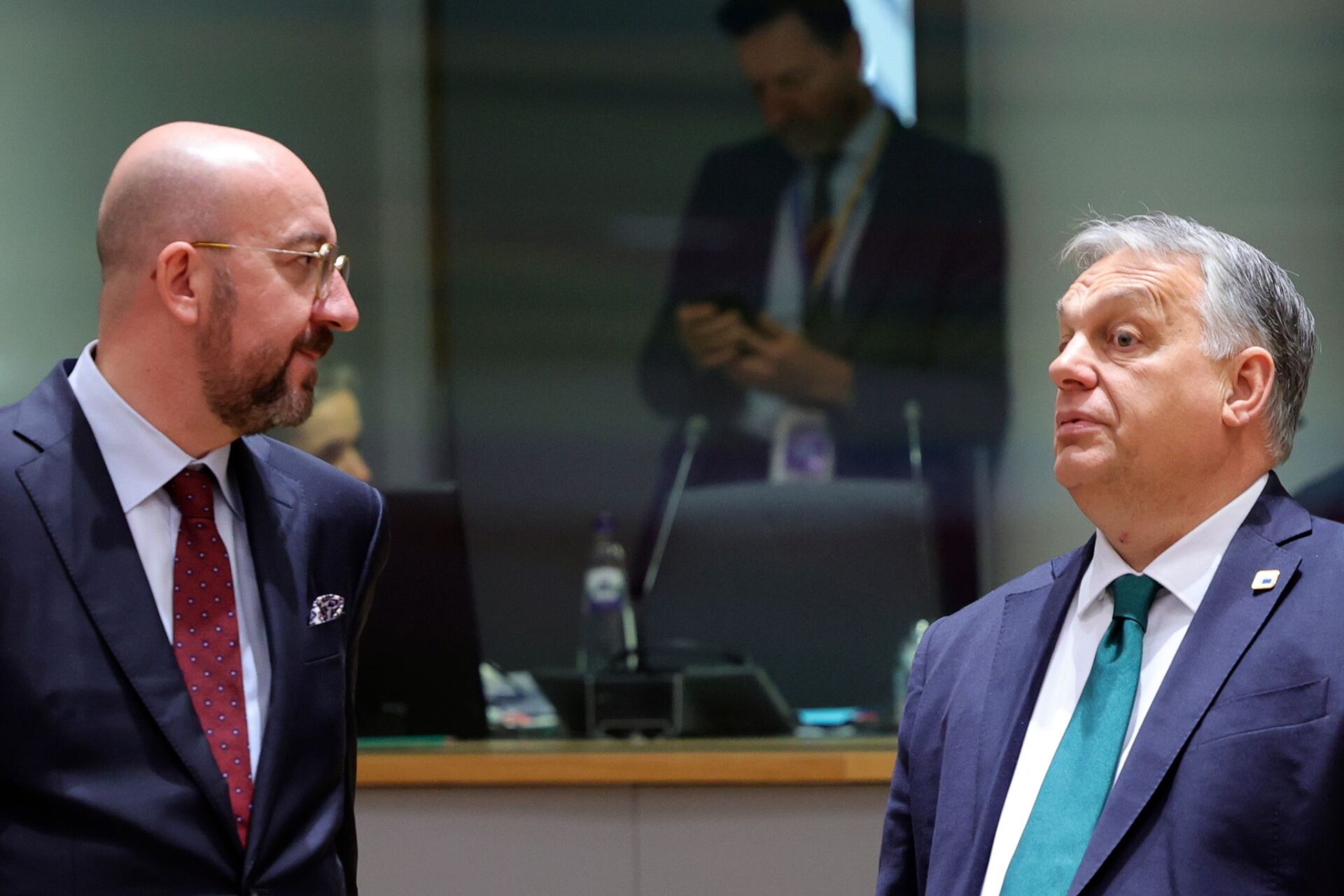 Have the article read by OpenAI (Beta). Please note that AI translations may take some time to process.
Have the article read by OpenAI (Beta). Please note that AI translations may take some time to process.Orbán agrees to new support package for Ukraine
Brussels (Belga) – “All 27 leaders agreed on an additional 50-billion-euro support package for Ukraine within the EU budget,” European Council President Charles Michel reported on X. He said the agreement provided “steadfast, long-term, predictable” funding for Kiev in the longer term. The “EU is taking leadership & responsibility in support of Ukraine; we know what is at stake.”
Hungarian Prime Minister Viktor Orbán, who had stubbornly opposed the package at the December summit, is now also on board. A number of leaders, including Michel, German Chancellor Olaf Scholz and French President Emmanuel Macron, are said to have convinced him to abandon his opposition in a separate get-together before the start of the summit.
Orbán was pushing for an annual veto on funding, but he failed to secure it. The heads of state and government will, however, hold an annual debate on the implementation of the aid package, based on a European Commission report. “If necessary” the leaders could also ask the Commission to propose a revision within two years, diplomatic sources said.
The new aid package, comprising 17 billion euros in grants and 33 billion euros in loans, runs until 2027. It should provide Ukraine with much-needed funds to keep the state apparatus running during the exhausting war with Russia, especially now that there is uncertainty over US aid due to the split in parliament in Washington.
The Ukraine aid package is part of a broader review of Europe’s multi-year budget. It is now up to the Belgian EU presidency to clinch the deal with the European Parliament, which must also give its approval. Negotiations will start on Monday on the sidelines of the Parliament’s plenary session in Strasbourg. (1 February)
EU anti-money-laundering authority: Lindner promotes Frankfurt in Brussels
Brussels (dpa) – German Finance Minister Christian Lindner has campaigned in Brussels to promote Frankfurt as the headquarters of the planned EU anti-money-laundering authority (AMLA). At a public hearing in the European Parliament in Brussels on Tuesday, the politician said that Frankfurt had everything AMLA needed to be operational from day one and to exercise its tasks and powers in full. The Federal Republic of Germany, the state of Hesse and the city of Frankfurt intend to provide at least ten million euros for the establishment of the agency.
Lindner went on to say that as an important financial centre, Frankfurt had a large pool of financial and academic talent and attracted people from all over the EU and beyond. “The close proximity to the European Central Bank (ECB) enables us to create a central point of contact for European supervision.” This was crucial to effectively combat money laundering, said Lindner. He then answered questions from MEPs and representatives of the EU countries.
The European Commission had proposed a joint money laundering authority in 2021, to coordinate and support the national supervisory agencies. In addition to Frankfurt, Rome, Vienna, Vilnius, Riga, Dublin, Madrid, Brussels and Paris are also vying to host the new authority. The decisive vote by the representatives of the European Parliament and the EU countries is scheduled for 22 February.
For the first time, public hearings are part of the process for selecting the seat of a new EU agency. The European Court of Justice has granted the European Parliament the same right as the member states to have a say in determining the seat of future agencies. (31 January)
Brussels asks France for explanations over attacks on Spanish lorries
Brussels (Europa Press) – The European Commission has asked France to explain the protests by French farmers, which have included blocking the passage of lorries carrying Spanish products, EU sources told Europa Press.
In principle, the Commission saw no evidence of the unfair competition claimed by French Prime Minister Gabriel Attal, the sources added.
Last Sunday, Attal said that the French government was studying measures to tackle “unfair competition,” something that has been interpreted as a veiled reference to Spain and Italy.
Two days earlier, the Commission had sent a letter to the French authorities asking for explanations about the border disturbances and reminding them that EU member states must take measures to ensure the free movement of goods when an obstacle appears.
For his part, the Spanish Minister of Agriculture, Fisheries and Food, Luis Planas, has responded to Attal by saying that “there is no competitive advantage derived from the application of different rules,” because all member countries apply the same production and marketing rules. (29 January)
This is a compilation of the European coverage of enr news agencies. It is published on Fridays. The content is an editorial selection based on news by the respective agency.
